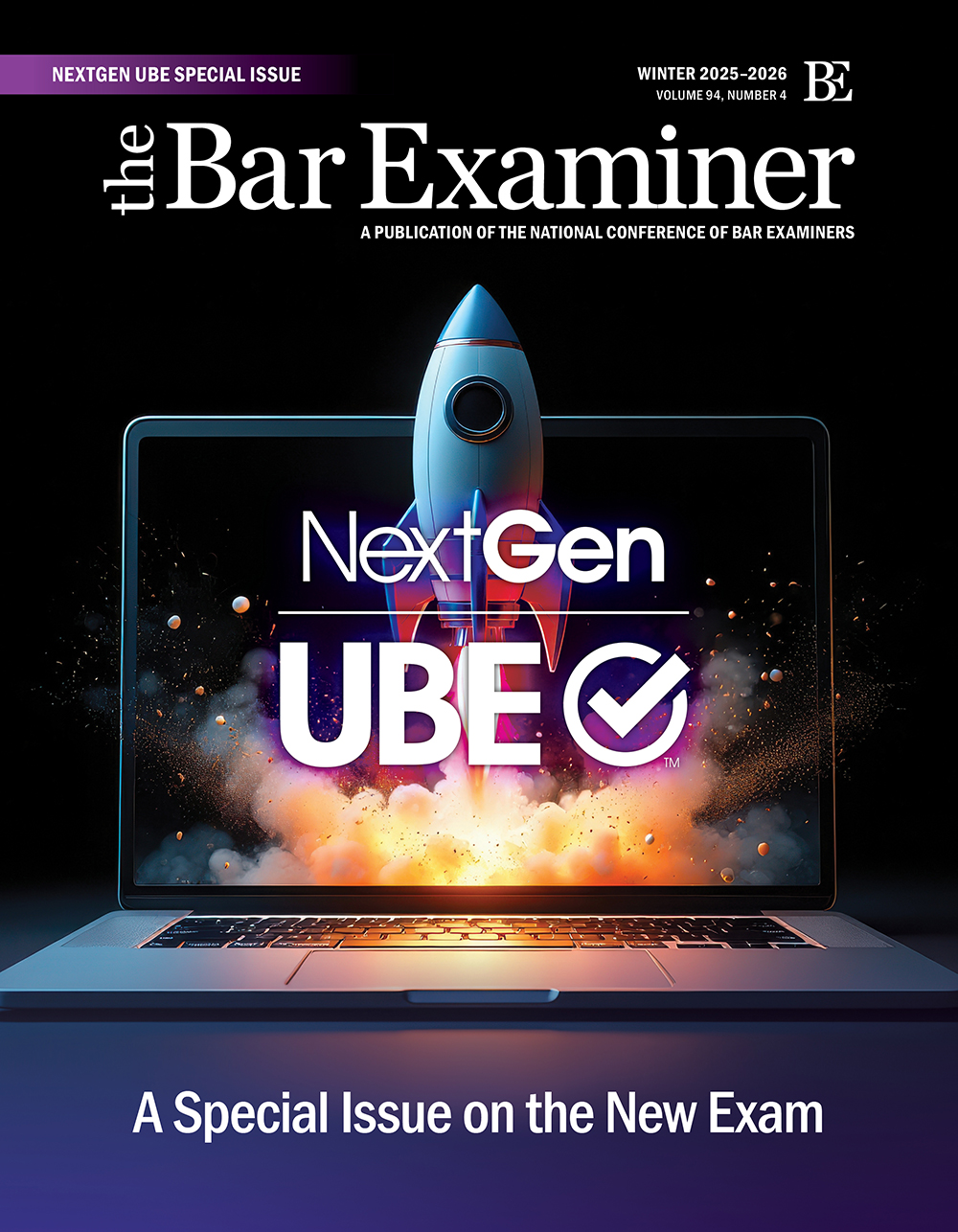This article originally appeared in The Bar Examiner print edition, March 2014 (Vol. 83, No. 1), pp. 4–5.
By Erica Moeser Every so often it’s a good idea to try to “think outside the box,” and this is one of those times. Of course, sometimes all that thinking leads one to conclude that thinking inside the box wasn’t so bad after all. NCBE is offering bar examiners, as well as the potentially larger constituency that reads this column, the opportunity to express an opinion on an idea that has escaped the box.
Every so often it’s a good idea to try to “think outside the box,” and this is one of those times. Of course, sometimes all that thinking leads one to conclude that thinking inside the box wasn’t so bad after all. NCBE is offering bar examiners, as well as the potentially larger constituency that reads this column, the opportunity to express an opinion on an idea that has escaped the box.
The idea concerns the timing of the bar examination. When the MBE was introduced in 1972, a universal bar examination date was established for the first time. (And the world did not end.) The test, then and now, is administered on the last Wednesday in February and July. Recollections can differ, but some believe that when the late July date was chosen, the spring semester at law schools ran later than it does now.
Now fast-forward to the present. The vast majority of law schools conclude classes by the middle of May, leaving a gap of nine (or more) weeks between the end of law school and the bar examination. At a time when hastening the entry of law graduates into the profession seems to be occupying the time of some statewide committees that are looking at licensure issues, it may be time to consider whether the July bar examination should move earlier in time—perhaps by as much as a month.
Some early responders have expressed their opinions that the answer should be a resounding yes, and others have reacted with horror. That, of course, is what makes thinking outside the box so much fun—and so necessary.
I must say that the reaction that causes me the most concern is the one that focuses on how bar review courses are going to cope with compressing the time frame that now exists. When I hear law deans quoted, in particular, I find myself wondering how law school—as preparation for entry into practice—and bar examining—which has moved in the direction of confining test material to what a new lawyer ought to know and be able to do—remain so far apart that law schools feel that the lapse of time is essential for external preparation that will see graduates through a successful bar exam experience.
(Apropos of that, I was surprised to learn from academic support personnel who attended an NCBE-sponsored seminar last fall that an overwhelming majority of the 50+ law schools represented have opted to deliver bar preparation courses for credit using commercial bar review providers rather than engaging traditional faculty to perform this work. The amendment of the ABA Standards to permit offering bar prep courses for credit has evidently opened up a new marketing front for bar review providers.)
Can we create a “new normal,” as it’s called, with a June bar exam? Will bar review courses adjust their schedules to accommodate? I suspect they have far too much money in the game to fail at this. (Rescheduling the February bar exam would follow, but it is the July exam that affects the large majority of emerging graduates.)
Let’s imagine, though, that we remain happily inside the box on this one and that the July bar exam continues to be administered on the last Wednesday of the month. Are there other strategies that will get new lawyers licensed more expeditiously? Well, yes, there are, so out of the box we go again:
There is nothing to stop bar examiners and the Courts they serve from giving those candidates who wish to take the bar exam after completing two years of full-time attendance (or a certain number of law school credits, such as 60) the option to do so. The price of this to some students might be giving up the opportunity to use the time between the second and third year in summer associate programs. The payoff for many would be licensure at graduation.
There is also nothing to stop bar examiners and law schools from fashioning a final-semester curriculum that would accommodate the taking of the February bar examination. This option disappeared when Georgia was the last to abandon it—presumably because it interfered with the final-semester classes; however, the idea has just been resurrected in a much more promising form in Arizona, where the Supreme Court and the law schools agreed to develop a pilot program that builds in time during the last semester to prepare for the exam and time after the exam for experiential learning opportunities.
In all cases, the granting of a law license would await the conferral of the J.D. degree.
As has been the case for as long as I have been around bar admissions (since Noah and the Ark, it seems), some jurisdictions are flirting with the idea of offering the diploma privilege, thereby addressing the gap between law school and licensure in a different way. I find little reason to favor that option. There are too many law schools (one being too many) that reach so far into the applicant pool that their students have abysmal chances of passing a bar exam. Awarding the franchise of deciding who is competent enough to enter the profession to law schools is therefore not a wise choice. (If it were, other professions—medicine, dentistry, etc.—would have embraced it by now.) Properly administered, the diploma privilege would place fetters on law schools by requiring curriculum and course content that are anathema to those concerned with academic freedom.
It would be easy to ascribe my skepticism about the diploma privilege to the fact that I have worked at NCBE for almost two decades, but that is not the reason. I am a diploma admittee in Wisconsin, the lone diploma privilege jurisdiction (there, I’ve said it), and for 17 years before that I was the Director of the Wisconsin Board of Bar Examiners. Few people have had a closer association with the diploma privilege concept than I. Its merits are more than offset by its flaws, in my opinion. (And that is a reason why creating a testing system, the merits of which more than offset its flaws, is so important to me professionally.)
This column is an invitation for any reader to share thoughts on the subject of the timing of the bar exam, which I will in turn share with the NCBE Board of Trustees over the course of the next several months. The box—both inside and out—is yours to explore!
Contact us to request a pdf file of the original article as it appeared in the print edition.







